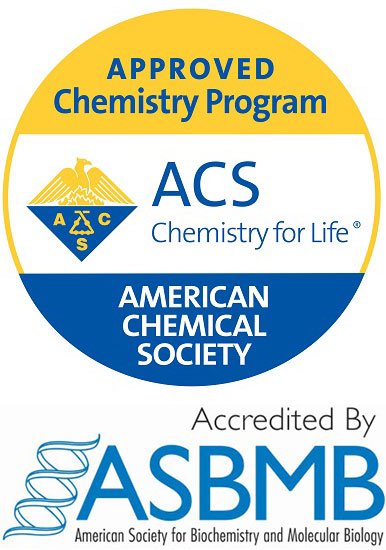Chemistry and Food Science
A unique partnership of related fields that enriches both and offers more options to students
 The Department of Chemistry and Food Science is unique in that it offers strong majors in two fields. The programs complement one other, producing Food Science majors with an exceptionally strong background in chemistry, and providing Chemistry and Biochemistry majors with the opportunity to take electives in more applied areas such as food chemistry, food analysis, and food engineering. Undergraduate research opportunities are also enhanced by the combination of these program areas. The outstanding achievement records, employment opportunities, and graduate school placements enjoyed by Department graduates attest to the strength of these programs.
The Department of Chemistry and Food Science is unique in that it offers strong majors in two fields. The programs complement one other, producing Food Science majors with an exceptionally strong background in chemistry, and providing Chemistry and Biochemistry majors with the opportunity to take electives in more applied areas such as food chemistry, food analysis, and food engineering. Undergraduate research opportunities are also enhanced by the combination of these program areas. The outstanding achievement records, employment opportunities, and graduate school placements enjoyed by Department graduates attest to the strength of these programs.
An excellent undergraduate education is provided by the structured curricula of the Chemistry, Biochemistry, and Food Science majors. Each program satisfies the University's General Education Domain II-B (Natural Sciences) course and laboratory requirements. Go to bottom of page for links to specific course requirements for all majors and concentrations.
WHAT IS FOOD SCIENCE?
"Food science draws from many disciplines such as biology, chemical engineering, and biochemistry in an attempt to better understand food processes and ultimately improve food products for the general public. As the stewards of the field, food scientists study the physical, microbiological, and chemical makeup of food. By applying their findings, they are responsible for developing the safe, nutritious foods and innovative packaging that line supermarket shelves.
"The food you consume on a daily basis is the result of extensive food research, a systematic investigation into a variety of foods’ properties and compositions. After the initial stages of research and development comes the mass production of food products using principles of food technology. All of these interrelated fields contribute to the food industry – the largest manufacturing industry in the United States."
—from the website of the Institute of Food Technologists
LAB SAFETY
Lab instruction involves the handling of chemicals and materials that present certain safety risks. Framingham State University is committed to ensuring the health and well-being of all University employees, students, and visitors. In regard to lab safety specifically, the University is legally obligated to follow the provisions of the "Lab Standard" regulation of the federal Occupational Safety and Health Administration.
The goal of the Lab Standard is to ensure that all lab personnel are informed as to the chemical and other safety hazards present in the lab setting, and that appropriate work practices and equipment are in place to keep lab personnel safe. A critical element of the Lab Standard is the preparation of a Chemical Hygiene Plan (CHP) that spells out expected lab conduct, standard operating procedures, personal protective equipment, lab safety equipment, emergency procedures, etc. Click on the link for the full text of the University's CHP.
RELATED PROGRAM OPTIONS
Teacher Certification for High School Chemistry
Chemistry and Biochemistry majors have the option of pursuing a career teaching high school chemistry. Framingham State offers two pathways to chemistry teacher certification: One is an Education minor coordinated with the Chemistry or Biochemistry major. The other is a post-baccalaureate licensure program. For more information please visit the Chemistry Teacher Certification page.
Pre-Health Studies Program
The Pre-Health Studies Program, jointly run by the Biology Department and the Chemistry & Food Science Department, provides career-specific course guidance to students in any major who are interested in pursuing a medical, dental, pharmacy, veterinary, or other health-related career. Students in the Program also have the opportunity to apply to the Health Professions Advisory Committee for a composite letter of recommendation. Please visit the Pre-Health Studies Program page for more information.
Science Communication Minor
Chemistry, Biochemistry, and Food Science majors who are considering a career in a science writing, editing, publishing, or broadcasting may elect to declare a Science Communication minor, an interdisciplinary minor offered by the English Department. To declare a Science Communication minor, students must complete the appropriate form and obtain the department Chair's signature from one of the following departments: Communication, Media, & Performance; English; or Environment, Society, & Sustainability. The minor consists of five courses, three required plus two electives. Four of the five courses must be taken outside the major department. Students should meet with an advisor in the minor to design a course plan. See Program link below for detailed course information.
CHEMISTRY AND FOOD SCIENCE FOR NON-MAJORS
The Chemistry minor consists of four required courses - the freshman chemistry sequence and one year of organic chemistry - plus two electives. The Biochemistry minor has six required courses: the freshman chemistry sequence, one year of organic chemistry, and one year of biochemistry. The Food Science minor consists of five required courses and two electives. See Program links below for elective options.
For non-science majors the Department offers a number of general education courses on a variety of topics including the chemistry of life, environment and health, and principles of food science.
